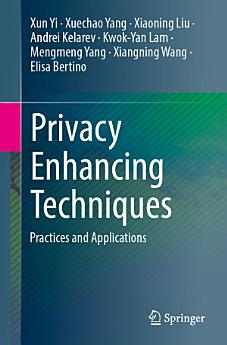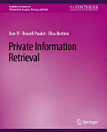Privacy Enhancing Techniques: Practices and Applications
About this ebook
The chapters cover fundamental cryptographic principles and extend into applications in privacy-preserving data mining, secure machine learning, and privacy-aware social networks. By combining state-of-the-art techniques with practical case studies, this book serves as a valuable resource for those navigating the evolving landscape of data privacy and security.
Designed to bridge theory and practice, this book is tailored for researchers and graduate students focused on this field. Industry professionals seeking an in-depth understanding of privacy-enhancing technologies will also want to purchase this book.
About the author
Xun Yi is a Professor with the School of Computing Technologies, RMIT University, Australia. His research interests include data privacy protection, cloud and IoT security, blockchain, network security, and applied cryptography. He has published over 300 research papers in international journals and conference proceedings. He serves as an Associate Editor for IEEE Transactions on Dependable and Secure Computing, IEEE Transactions on Knowledge and Data Engineering, ACM Computing Surveys, and Information Sciences.
Xuechao Yang is a Lecturer at the School of Computing Technologies, RMIT University, Australia. He holds a bachelor’s degree in Information Technology from RMIT (2013) and a bachelor’s degree in Computer Science with Honours (2014). He earned his Ph.D. from RMIT in 2018. His research interests include cryptosystems, privacy preservation, and blockchain technology.
Xiaoning Liu (Member, IEEE) is a Lecturer at the School of Computing Technologies, RMIT University, Australia. Her research focuses on secure computation protocols and privacy-preserving machine learning. She earned her Ph.D. in Computer Science from RMIT in 2022. Her work has appeared in IEEE TDSC, IEEE TIFS, ESORICS, and USENIX Security. She received the Best Paper Award at ESORICS 2021.
Andrei Kelarev is a Research Fellow at the University of Newcastle, Australia. He is the author of two books and 198 journal articles. He previously served as Associate Professor at the University of Wisconsin and University of Nebraska (USA), and as a Senior Lecturer at the University of Tasmania. He was Chief Investigator for a major Discovery Grant from the Australian Research Council. His research involves cybersecurity applications of machine learning and data mining.
Kwok-Yan Lam (Senior Member, IEEE) received the B.Sc. degree (Hons.) from the University of London in 1987 and the Ph.D. degree from the University of Cambridge in 1990. He is Associate Vice President (Strategy and Partnerships) and Professor at the College of Computing and Data Science, NTU Singapore. He directs the Strategic Centre for Research in Privacy-Preserving Technologies and Systems. Since 2020, he has been a consultant on cyber and technology innovation for INTERPOL. He was previously Professor at Tsinghua University (2002–2010) and faculty at NUS and the University of London. His research areas include distributed systems, IoT security, blockchain protocols, homeland security, and cybersecurity.
Mengmeng Yang received her Ph.D. in Computer Science from Deakin University, Australia, in 2019. She is a Research Scientist at Data61, CSIRO, Australia. Previously, she was a Research Fellow at the Strategic Centre for Research in Privacy-Preserving Technologies and Systems (SCRiPTS), NTU Singapore. Her research interests include privacy preservation, data mining, and network security.
Xiangning Wang received the B.Sc. degree from Peking University in 2016 and the Ph.D. degree in Computer Science from the University of Hong Kong in 2021. He is a Research Fellow at NTU Singapore. His research interests include privacy-preserving machine learning and differential privacy.
Elisa Bertino is a Samuel Conte Distinguished Professor of Computer Science at Purdue University. Her research focuses on data privacy and computer security. She has authored or co-authored over 250 journal articles, 450 conference papers, 9 books, and 35 edited volumes, with more than 300 collaborators. She served as co-editor-in-chief of the GeoInformatica Journal and VLDB Journal and as program chair for ICDE 1998, ECOOP 2000, SACMAT 2002, and EDBT 2004. She is currently Vice President of ACM.





